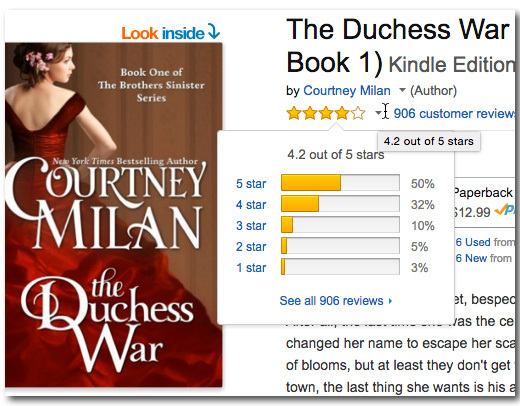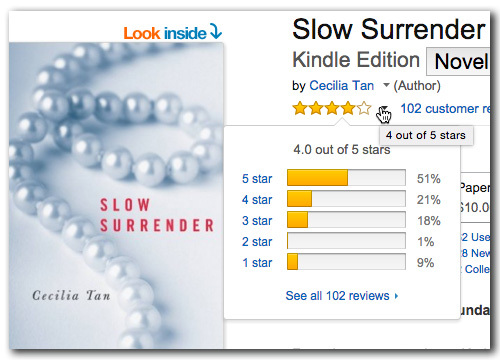Writing Advice: What I Learned from Reading One-Star Reviews
There are some lessons as a writer that one learns over and over. One that keeps coming around again and again for me is this: What some people love most about a book or story will be the SAME THING that other people hate the most.
I first learned this as an editor. I’ve edited over 100 anthologies of erotic short stories for Circlet Press and many other publishers. In these I was often culling through a slush pile of dozens–sometimes hundreds–of submissions, trying to find stories that were a fit. Every editor looks for stories that are both of publishable quality AND which meet that editor’s particular taste. But there were times when a story would be on the bubble, when for some reason I didn’t outright reject it but didn’t accept it right away either.
These “bubble” stories were often ones where I had doubts, where something made me question either my taste or whether the story was truly a “fit”–and yet I didn’t reject them right away. More often than not I “took a chance” and published the story anyway, despite my reservations. My instincts were trying to tell me something. I would rationalize it as, well, in an anthology with a dozen stories, you want variety, you want a panoply of style and theme… but almost always these “questionable” stories would turn out to be the ones that people loved the most.
Invariably what I found was that if there was a story I was questioning, but my instinct made me pick it anyway, it would be the one story that got singled out for praise by reviewers and literary critics. It would be the one story that got fan mail, the one where customers on Amazon wrote “this story was worth the price of admission.”
Interesting, no?
Same thing in my MFA writing workshops in grad school. The stories or chapters or poems that the class argued the most about–meaning some of the students hated it and some loved it–were often the ones I was sure were actually the best stories. I found myself sometimes taking a fellow student aside and telling them, essentially, don’t let the haters get you down. Sometimes you walk out of a workshop feeling like the life’s been beaten out of you because the reaction was so negative from other students. “Don’t feel bad,” I’d say. “Getting a rise out of them is the proof that you’re actually onto something, you’re writing is actually working. When the story doesn’t work, nobody really cares.” The writers by and large who were able to take that negative feedback as a positive sign were the ones who went on to publish and have careers as pros. The ones who were too discouraged to keep going…didn’t.
As I was saying yesterday when I posted about the starred review in Publishers Weekly my most recent book (TAKING THE LEAD) received, the reviews for my first book from a major publisher, Black Feathers from HarperCollins, were mixed. The reviewer for PW back in the day didn’t like my “sinless creations” and found them only for “people who don’t like sex.” Presumably the stories were simply too consensual for his taste, but that was the very thing that others (and readers) found so fresh and enticing about my work.
Nowadays, the place many writers take their beatings is in public, on Goodreads and on Amazon, where anyone can rate and review a book, even if they didn’t read it. (No really, go look at the huge number of one-star reviews that say things like “I will never read a book by this author because ____________”. Punitive one-star reviews, where reviewers down-vote everything by an author because they don’t like something they said on Twitter, or because they’re down-voting everything with gay characters, or whatever other blanket reason they’re acting out on the Internet, are not the ones to pay heed to, and not the ones I’m taking about here.)
Online reviews on places like Yelp tend to fall into the love it or hate it category. People don’t bother to review a restaurant unless they had a fantastically noteworthy meal or such a horrible one they have to vent. But with books it’s a little different. Amazon nags you to review everything you buy from them, no matter how you felt about it, so that evens things out somewhat. And Goodreads becomes a place where people review everything on their shelf for multiple reasons: they love books, they love to talk about books, they love to network with other people who love books, they want the points or cred they seem to get for having lots and lots of books on their GR shelf, they like the sense of accomplishment of reading lots of books and rating/reviewing on GR gives a concrete way of tracking and sharing that info, etc. etc. Book people have always liked talking about books–that’s part of what makes us book lovers in the first place.
Several high-profile authors took to Twitter recently posting screenshots and quotes from their one-star Amazon reviews, some even making videos of themselves reading them aloud, and the results were predictably hilarious. Check out this compilation below of sf/fantasy authors from Gollancz doing it:
There are of course some one-star reviews that just make you giggle, like one that said the reviewer’s dog had chewed up the book so they DNF’d it (“Did Not Finish”) or where the customer just seems like a total nutjob. Books aren’t the only things getting this treatment, check out this piece in Mother Jones about one-star Yelp reviews for places like The Grand Canyon. One called the desert “too hot,” while another was angry that at Badlands “the mud wasn’t even differently colored layers… It was brown.” (I confess I’ve written TripAdvisor reviews for things like the glaciers we saw in Alaska. “A+++ glacier, very icy. Would visit again.”)
But this interest in one-star reviews got me reading more of them, not the hilarious ones or the punitive ones, but the ones where people really seemed earnestly angry or upset about a book. And not surprisingly, I found the same phenomenon as in my editing work: The five-star reviews, the critics in trade publications, they would praise something about a book that made the book stand out to them…and those exact same elements would be the things called out in the one-star reviews.
I just finished a book I found delightful, Courtney Milan’s The Duchess War (The Brothers Sinister Book 1) , with 906 reviews on Amazon (and happens to be FREE to download for Kindle at the moment). It’s historical romance, so it runs in some very very familiar tracks, and yet it felt fresh and new to me in many ways. For example, the wedding night scene I loved so much for being so daringly realistic–leading to a scorchingly believable honeymoon of sex and debauchery–was called out by some Amazon reviewers as “disgusting” and “disappointing.” What!! I couldn’t believe it.
, with 906 reviews on Amazon (and happens to be FREE to download for Kindle at the moment). It’s historical romance, so it runs in some very very familiar tracks, and yet it felt fresh and new to me in many ways. For example, the wedding night scene I loved so much for being so daringly realistic–leading to a scorchingly believable honeymoon of sex and debauchery–was called out by some Amazon reviewers as “disgusting” and “disappointing.” What!! I couldn’t believe it.
The reviews for The Duchess War are overwhelmingly positive, 82% are 4 or 5 stars, what about the 27 people who wrote the one star reviews? I couldn’t believe people could possibly gripe about this book I found wonderful. But some did. Most of them boiled down to either “this wasn’t what I expected” or “this wasn’t what I wanted.” Those are perfectly legitimate reasons for a buyer to give a one-star review–and those one-star reviews are helpful to other customers who may share the same tastes–in particular on how closely their tastes hew to what has come before. Because ultimately the elements that were picked out for complaint were the same things I loved about the book!
What was wonderful to me about THE DUCHESS WAR was how it broke out of the mold of historical romance while still–for me–fulfilling the feelings I want from a historical. But for some people, stray too far from the mold and it no longer fits what they were looking for. When you go into a pizzeria, maybe you’re delighted to find they’ve got some unique topping (mango! smoked salmon! walnuts!) or maybe your stomach is turned (gross!!) or it might be good but it’s not “pizza” to you, doesn’t satisfy your craving for what you want. As writers we’re being told constantly that we have to do something new, “be creative!” and escape cliche, but the moment you do you risk disappointing readers. Perhaps it’s important to remember two truisms about writing: 1) you can’t please all the people all the time, and 2) the most important reader to please is yourself.
In my own books the majority of my one-star reviews for years and years were a clear indicator I was doing something right. They fell into two categories:
1) There was TOO MUCH SEX in this book
2) This book gave me gay cooties.
A recent one-star review of Slow Surrender gripes: “Hands down the worst book I’ve ever read. Not even 10 pages in and there’s a sexual scene.” One-hundred percent true: if I can’t get my characters into a sexual situation in the first chapter, I don’t consider what I’m writing erotica. (Btw, in the “sexual scene” on page ten our hero never touches the heroine and no one’s clothes come off. In case you were wondering how a book called “Slow Surrender” jibes with the sexual interaction starting right away.) That reviewer was at least factually correct, though. So are the ones like an Audible reviewer who wrote about
gripes: “Hands down the worst book I’ve ever read. Not even 10 pages in and there’s a sexual scene.” One-hundred percent true: if I can’t get my characters into a sexual situation in the first chapter, I don’t consider what I’m writing erotica. (Btw, in the “sexual scene” on page ten our hero never touches the heroine and no one’s clothes come off. In case you were wondering how a book called “Slow Surrender” jibes with the sexual interaction starting right away.) That reviewer was at least factually correct, though. So are the ones like an Audible reviewer who wrote about





